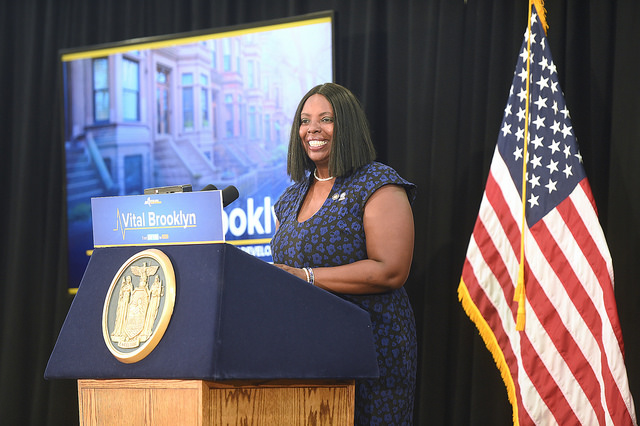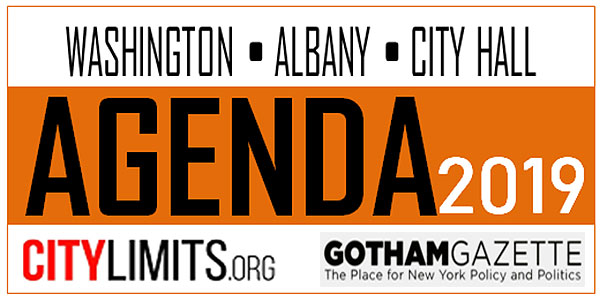
Assemblymember Latrice Walker (photo: Kevin Coughlin/Governor's Office)
This is part of AGENDA 2019, a joint Gotham Gazette-City Limits project
Find the rest of the series here
Assemblymember Latrice Walker, a Brooklyn Democrat, has been pushing for criminal justice reform in New York, and believes that 2019 will hold long-sought progress. Among the several pieces of legislation introduced in the Democrat-dominated Assembly that address criminal justice reform, one of the most significant proposals is Walker’s bail reform bill, which passed the Assembly in June but did not move in the Republican-controlled state Senate.
With Democrats having taken the majority in the state Senate through this month’s elections, next year could bring sweeping changes to the criminal justice system in New York, with bail reform atop the priorities for many elected officials, advocates, and others, including Walker, soon-to-be Senate Majority Leader Andrea Stewart-Cousins, and Governor Andrew Cuomo, a Democrat entering his third term. The two legislative majorities and governor will have to work out the details of any reforms, of course, and there are different bail reform proposals.
The need for such reform is evident in Walker’s district, she explains. Representing neighborhoods such as Brownsville and Ocean Hill, Walker, a Brownsville native herself, has seen the current system’s effects first-hand. During a recent appearance on the Max & Murphy show on WBAI radio, Walker explained the “billion-dollar blocks” in her district, which is home to significant poverty, and elsewhere, as areas from which many people have gone to jail or prison, with government spending totaling billions of dollars to detain those people. It’s a way of both pointing out the high costs of mass incarceration and the lack of investment in those same communities for helping people escape poverty and related problems.
Walker believes the current criminal justice system is based around punishing people, and that bail should not be part of that picture, but one area for reform that can then stop feeding the larger problem.
“Bail is supposed to just ensure a person’s return to court. We know that the constitution declares that it’s not supposed to be cruel, unusual, and it’s not supposed to be punishment. And I think that that’s the term that many people forget about New York’s bail system,” Walker said. She’s observed that there has been a rubric of sorts set up in courts where there is more focus on the type of crime allegedly committed, the individual, and the neighborhood in which they live, to determine whether a person is required to post bail.
With her proposal, Walker aims to make the system what it was supposed to be, she says. “It bewilders me when I see attorneys, judges and the like say to me, even across the state of New York, ‘well there has to be some system or something put in place that will ensure that bad people don’t get put back into the streets,’ but that’s not what bail is about, and that’s what I’m here to defend.”
Of course there are certain alleged crimes where the defendant should either have conditions put on their release or not be released at all, argue Walker and others pushing for bail reform, especially major changes or an end to cash bail, but there are many, many others where bail has simply become a punishment of poverty, leading many poor people to spend time in jail for lower-level offenses.
“The bail bill that I introduced allows for an automatic release on a person’s own recognizance in certain situations where their violations, misdemeanors -- other than sex offense misdemeanors, non-violent felonies, and two categories of violent felonies,” Walker explained. A person is not released on their own recognizance if they’ve committed sex offense misdemeanors or most violent felonies. However, the two categories of violent felonies the bill does exempt are burglary or robbery in the second degree, as well as falsely reporting an incident in the second degree.
Walker’s proposal was developed by looking at bail “in the context of speedy trial” and “discovery reform,” she said, which are two other major categories of criminal justice reform Democrats pledge to pursue in Albany next year, where state Senate Republicans had largely disagreed with the bills put forth by Assembly majority and Senate minority Democrats.
The bill would also allow for a defendant to be released on non-monetary conditions but with court-ordered monitoring. Depending on what the court decides, the defendant could be monitored by a pre-trial services agency, the imposition of travel restrictions, and as mentioned by Walker on WBAI, through the use of electronic monitoring systems.
In the cases such as violent felonies, sex offense misdemeanors, and situations where the person released on recognizance or under non-monetary conditions fails to follow through with the conditions of their release, monetary bail can be set. In cases where a person is charged with sex offense felonies, terrorism crimes, class A felonies, witness intimidation, or felonies involving intent to causes injury or death, monetary bail may also be set, though remand without bail (no pre-trial release at all) is also an option.
C ourt-ordered electronic location monitoring would be applicable to defendants when "no other realistic conditions (would) suffice to reasonably assure the defendant's return to court" or when they are charged with a felony, misdemeanor domestic violence, a misdemeanor sex offense, or other crimes outlined in the bill.
ourt-ordered electronic location monitoring would be applicable to defendants when "no other realistic conditions (would) suffice to reasonably assure the defendant's return to court" or when they are charged with a felony, misdemeanor domestic violence, a misdemeanor sex offense, or other crimes outlined in the bill.
Walker recognizes that there are opponents of her plan to her right and her left, and says she’s taken into account the concerns some may have with parts of her proposal. The non-monetary condition situation, as she put it, brings about the question of whether mass incarceration is going to be allowed to be replaced by mass surveillance.
“I wanted to be able to protect that because this new electric monetary system is a new iteration of the billion dollar blocks. Now instead of incarcerating people, you’re got everyone in the ankle bracelets,” said Walker. The widespread use of ankle bracelets is a secondary set-up that Walker said “sets up a system that we’re trying to do away with.”
There have been other versions of bail reform introduced in the Assembly, one of them by Assemblymember Daniel O’Donnell of Manhattan. When asked if there are any significant differences between the two versions of bail reform, Walker highlighted only one.
“In my bill, where a person is still required to be remanded in pre-trial jail, you have discovery reform procedures that kick into play. There is a certain number of time, I believe it’s five days, by which the defense is able to request of the prosecution a discovery evidence or any evidence that might lead to that person being acquitted at the end of a trial,” she explained. This component of her plan gives the person being charged with a crime other mechanisms to “put forth a formidable defense.”
According to the listing of Walker’s bill in the Assembly legislation database, the purpose of the bill is to significantly amend “New York's antiquated cash bail system” for the first in “nearly fifty years.”
“This legislation would move our state toward a more intelligent, individualized system of pre-trial release, monitoring and, when necessary, detention,” the bill states. “The bill is designed to end the current, reflexive overreliance on monetary bail, which each year results in the unnecessary and expensive pre-trial jailing of thousands of persons simply because they cannot afford a modest sum as collateral.”
The Assembly passed Walker’s bill in June as part of a broader criminal justice reform package. O’Donnell’s bill, known as the "bail elimination act of 2018," would fully eliminate the use of cash bail while also ensuring “provisions for pretrial detention,” but has not been voted on in the Assembly.
However, O’Donnell’s bill does have a “same-as” bill in the Senate, whereas Walker’s does not. That may well change come January when the new Legislature begins its work.
Walker said she remains “blindly optimistic,” though she is aware that there are other things that may take priority when the new legislative session begins and Democrats in control of the legislative and executive branches start getting to a long agenda, and that Democrats are not a “monolithic body.”
“I anticipate that bail reform, and criminal justice reform will remain an in-vogue topic,” she said.
[Listen to the full conversation: Assemblymember Latrice Walker on Max & Murphy Nov. 14 2018]
This is part of AGENDA 2019, a joint Gotham Gazette-City Limits project
Find the rest of the series here
***
by Annie Abreu, Gotham Gazette
@GothamGazette




